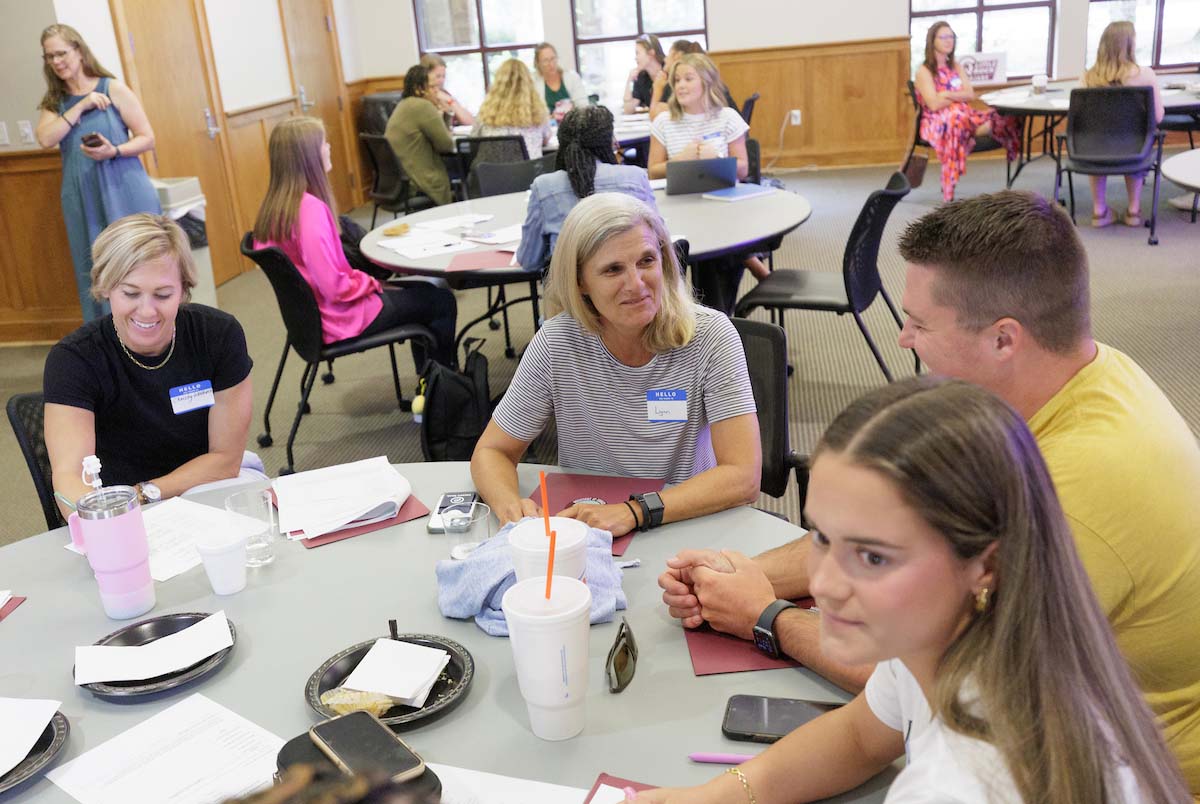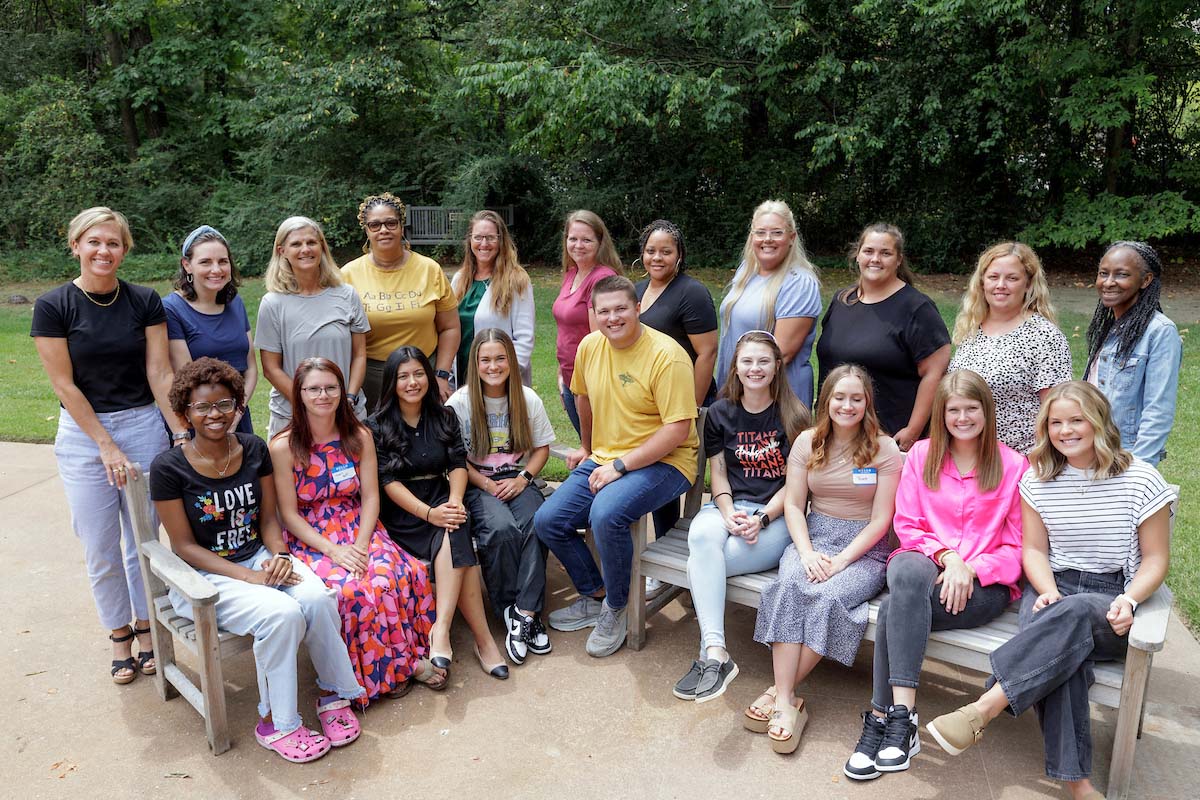Inspiration and success for UA Little Rock grads
August 19-25, 2024
By Angelita Faller
Nine new teachers complete innovative residency program
Nine talented new teachers have successfully transitioned from the classroom to full-time teaching roles after completing an innovative pilot teacher residency program between the University of Arkansas at Little Rock and partner school districts Jacksonville North Pulaski School District and Little Rock School District.
“It was a wonderful experience,” said Chadwick Comer, who is now teaching seventh-grade English language arts at Jacksonville Middle School, the same school where he completed his residency. “Unlike a traditional classroom observation, I had the opportunity to form bonds with my students, take charge, plan, and implement entire lessons, and make the mistakes most first-year teachers would make with the safety of a mentor teacher to catch me when I fell. I participated in every aspect of teaching from parent teacher conferences to professional learning community meetings and was made to feel like I was a part of the team that I will be teaching with this year.”
During the 2023-24 school year, the UA Little Rock students completed the pilot teacher residency program in lieu of traditional student teaching. Residents spent the entire academic year in the same classroom with an experienced teacher mentor, learning all the tricks of the trade to be successful educators. Now all graduates of the program have earned their bachelor’s degrees from UA Little Rock as well as earned their first full-time teaching positions.
“Being able to experience an entire school year co-teaching with a mentor teacher and engaging in the school culture enables our residents to learn not only how to be effective classroom instructors, but also collaborative colleagues and members of a team of educators,” said Dr. Rachel Eells, Windgate Endowed director of the School of Education at UA Little Rock. “Teaching is so much more than instruction, and the yearlong residency allows our teacher candidates to experience the fullness of the experience. They are day-one ready, after having had an immersive and rewarding experience over the last academic year.”
The teacher residency program is supported by a grant from Forward Arkansas, which is helping UA Little Rock address Arkansas’s teacher shortage by working to increase the number and diversity of teacher candidates entering the field.
Experienced educators like Wanda Eskridge, a fourth-grade math teacher at Murrell Taylor Elementary School in Jacksonville who is now in her 18th year of teaching, serve as mentors to the residents and provide them with invaluable experience by sharing their classrooms with the residents for the entire school year.
“In this profession, you want others to be successful,” Eskridge said. “It’s all about helping others that are coming in behind you. Serving as a teacher mentor is a great experience. They get to actually see from day one the ins and outs of education. The only thing I would do differently this year is to encourage my teacher candidate to start feeling more comfortable earlier in the year teaching the lessons so they can find out what teaching strategy works best for them. So many new teachers are coming into this profession. The fact that some of them work as a resident in this district and then get a job in this same district is exceptional.”
For Danica Jones-Yates, a native of Cabot, her teacher residency seemed like a perfect fit for her skills. After finishing her residency in first grade at Wakefield Elementary and graduating with her bachelor’s degree in elementary education in May, she headed right back to start her teaching career in the same school and grade as her residency.
“I truly think this is a must for any future teacher,” Jones-Yates said. “It allows novice teachers a chance to find their footing with support of a veteran teacher before being on their own. I have the added advantage of being in the same school I did my residency, so I have great support within the school already, which makes me feel more prepared as I know who I can contact for support, ideas, or materials to help ensure I’m providing the best learning experience for my students.”
Residents also receive support and mentoring from site coordinators who are placed at each of the partner school districts. They have weekly practicum sessions with the residents that are driven by data and go over helpful topics like classroom management, the latest teaching innovations, resume and cover letter writing, and interviewing.
“As a site coordinator, I strive to instill in residents the importance of classroom management, effective instructional strategies, and the ability to differentiate instruction to meet diverse student needs,” said Kenya Brooks, a site coordinator who works with residents at Little Rock School District. “I focus on building their confidence in using data to inform instruction, fostering a growth mindset, and emphasizing the significance of culturally responsive teaching. Moreover, I ensure they understand the importance of building strong relationships with students, colleagues, and the community.”
Heading into the second year of the program, Brooks plans to provide more support for the teacher mentors by giving them targeted professional development opportunities and resources to help them better support their residents.
“Additionally, I aim to incorporate more opportunities for residents to engage in collaborative problem-solving and peer learning,” Brooks said. “Gathering more frequent feedback from residents and mentors will also be a priority, allowing us to make real-time adjustments to the program to better meet their needs. I would like to express my gratitude to all the partners, mentors, and residents who have contributed to the success of our program. Their dedication and hard work have been instrumental in shaping a supportive and effective teacher residency model. As we continue to grow and refine the program, I am confident that we will keep making a positive impact on the teaching profession and the education of our students.”
Arij Khreiwesh, who completed her teacher residency at Wakefield Elementary, said the program really prepared her for the reality of becoming a teacher.
“I would have gone into my first year of teaching almost blind if it were not for the program,” said Khreiwesh, who will be starting her career as a second-grade teacher at Huda Academy. “I wasn’t prepared for the amount of work that goes into creating your classroom environment and having a system ready. I now know how important it is to have a schedule, be consistent with rules and expectations, and always have a plan. One of the most important things I learned was to be there for my students. It is important to gain their trust and for them to feel safe in the classroom.”
With the success of the pilot year of the residency program, the School of Education, housed within the College of Humanities, Arts, Social Sciences, and Education at UA Little Rock, has plans for a bright future on its horizon. About 15 of 40 total residents are in paid positions in Arkansas schools for this second year of the program, and the School of Education is working to expand those possibilities for future paid positions.
“This year, we will be preparing our special education, secondary education, and K-12 education programs to transition from our traditional internship to the full residency model, with a hopeful start in 2025-2026 school year,” Eells said. “We are also connecting with community colleges, more districts, and organizations like City Year and AR Kids Read to establish more partnerships. Teaching is so much more than instruction, and the yearlong residency allows our teacher candidates to experience the fullness of the experience.”
Photo Caption:
1. UA Little Rock students meet with mentors, site coordinators, and members of the School of Education at the Bailey Alumni and Friends Center at UA Little Rock.
2. Nicole Carroll, a 2024 graduate of UA Little Rock, participated in a pilot teacher residency program.
3.UA Little Rock education majors will become day-one ready teachers by participating in year two of the teacher residency program.
Photo Credit:
Photos by Benjamin Krain.





